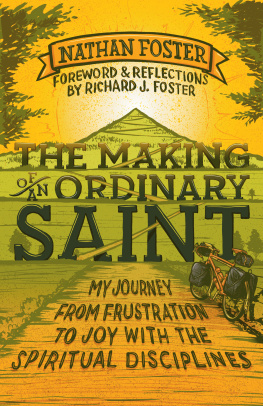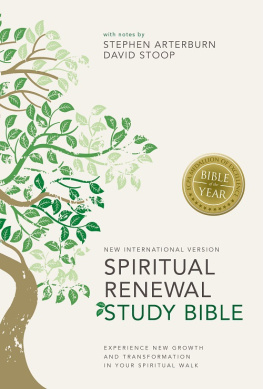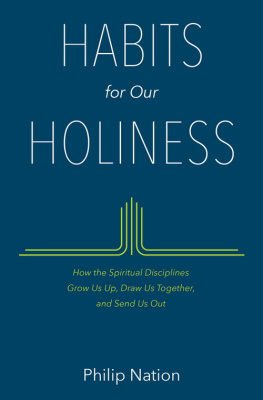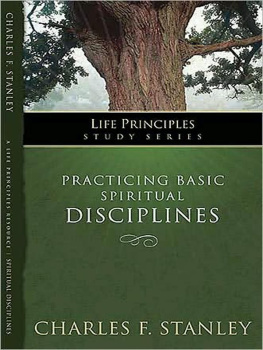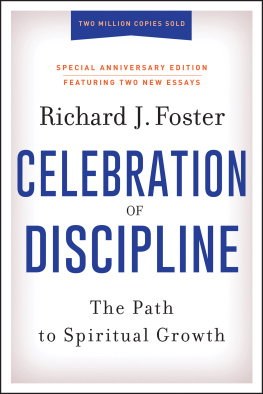T he classical spiritual disciplines are so named for their enduring usefulness to the church. They may be used with success as a means of effecting Christian maturity and cultivating heartfelt devotion to God. Among the practices highlighted here are: (1) solitude, (2) journaling, (3) silence, (4) fasting, (5) Bible intake,(6) devotional Bible study, (7) the use of imagination in Bible study, (8) simplicity, (9) practicing the presence,(10) confession (vertical and horizontal), (11) personal and intercessory prayer, and (12) celebration. Also included is an introduction to spiritual disciplines.
Following introductory matter, chapter two offers a theological context for the disciplines, before discussing potential benefits and potential dangers of such practices. The theological context asserts that God is knowable, that he initiates contact with his children, and that they are to eagerly respond to his overtures. Potential spiritual benefits covered include spirituality of the heart, production of spiritual fruit, variety for the devotional life, a directed approach to spiritual growth, psychological health, and improved corporate worship. Among potential spiritual dangers treated are subjectivity, convergence with unorthodox movements, legalism, pride, and privatization. The project narrative reviews the fourteen class presentations. Each discipline is defined, supported scripturally, and commented on by spiritual authorities. Practical tips and assignments accompany each session. An analysis of each lesson, its strengths and weaknesses, is given.
The last chapter of the main body of the project provides an evaluation. It is based on various written instruments administered to students. It contains not only evaluation of my teaching effectiveness, but also reports on the student benefits of the project. The latter aspect investigates the impact of the disciplines on both depth of relationship with God and general satisfaction with life.
An appendix provides short reviews on 124 important books and articles related to the field. These include general works on spirituality, volumes that present several disciplines under one cover, and contributions that focus on a single devotional practice.
The Project Introduction
I ntimacy with Jesus Christ is an indispensable part of the Christian life. Heartfelt love and devotion toward the Savior are of paramount importance. However, while such intimacy is needed, it is too often lacking.
One reason for this deficiency is that Christians have tended to emphasize objective aspects of the faith, to the neglect of subjective elements. Lovelace expressed this neglect as follows:
I woke up to the fact that spirituality was a drastically neglected subject among scholars. Christian experience was treated as an optional dimension of spiritual life, a sort of flavor additive that had its place in personal devotion and pastoral work but was marginal as a subject of serious reflection. Scholars focused on the outward shell of the Churchs theology and structures but overlooked the vital force that helped make the shell and determine its forms. (Lovelace 1988, 25)
Another explanation, for lack of personal intimacy with Christ, is lack of knowledge. Most believers have not been thoroughly instructed as to how they might go about developing this desired closeness.
Spirituality can be taught. In cooperation with the Holy Spirit, believers can lead fellow-Christians into intimate relationships with the Lord Jesus Christ (Hestenes 1988, 1320).
The Need for the Project
As the spiritual development of my congregation is one of my main ministry goals, I sense the need to teach them more about how to develop a fervent love for God. I want them to know, specifically, how they can seek a greater closeness with their creator. It is here that classical spiritual disciplines may be employed. They are time-tested means of cultivating fellowship with God. I take to heart Dallas Willards exhortation:
At this point in history, every leader among those who identify with Christ as Lord must ask himself or herself: How can I justify not leading my people into the practice of disciplines for the spiritual life that would enable them to reign in their lives by Christ Jesus? How can I fail to give them this opportunity? (Willard 1988, 246)
With primary focus on teaching believers specific ways to develop intimacy with God, I have entitled my project, The use of classical Spiritual Disciplines in Evangelical Devotional Life.
Primary Objectives
There are three primary objectives to this project: (1) that I will train a group of believers to enhance their spiritual lives through exposure to, and the practice of, a variety of spiritual disciplines, (2) that I will discover how to teach spiritual disciplines more effectively through verbal and written interaction with the group, (3) that I will enhance my own spiritual life through exposure to the literature concerning, and practice of, spiritual disciplines.
Methodology
To carry out this project I will need to conduct selective research from the vast array of literature on the subject. This will include consideration of pertinent books, articles, tapes, and unpublished materials.
Second, I will write two chapters that will be foundational for the teaching of the materials. One will consider theological issues pertaining to the disciplines, and the other will concern selected literature of the disciplines.
Third, I will teach a fourteen week course to a group of laymen meeting in a home study setting. Topics for the sessions include: (1) introduction to spirituality, spiritual disciplines, and course procedures, (2) solitude, (3) journaling, (4) silence, (5) fasting, (6) Bible intake, (7) devotional Bible study, (8) the use of imagination in Bible study, (9) simplicity, (10) practicing the presence,(11) confession (vertical and horizontal), (12) personal and intercessory prayer, (13) celebration, and (14) final summary and sharing.
The project has been approved by the elders of the church. A home has been secured in which to hold the study. It will run from February 18, 1993, through May 20, 1993. Many individuals have been challenged to participate and fifteen have given firm commitments.
Limitations
Several limitations will be placed on this project to make it manageable.
The number of disciplines considered will be twelve. These will provide the group with good variety without becoming unrealistically burdensome.
The participants will be asked to practice the disciplines for 30 minutes, four times a week, for eighteen weeks. The latter will encompass the fourteen weeks of the home study, plus four weeks following it.
Ideally, between fifteen and twenty people will participate. Less than twelve could lessen congregational impact, while more than twenty might negatively impact group dynamics, and complicate evaluation.


